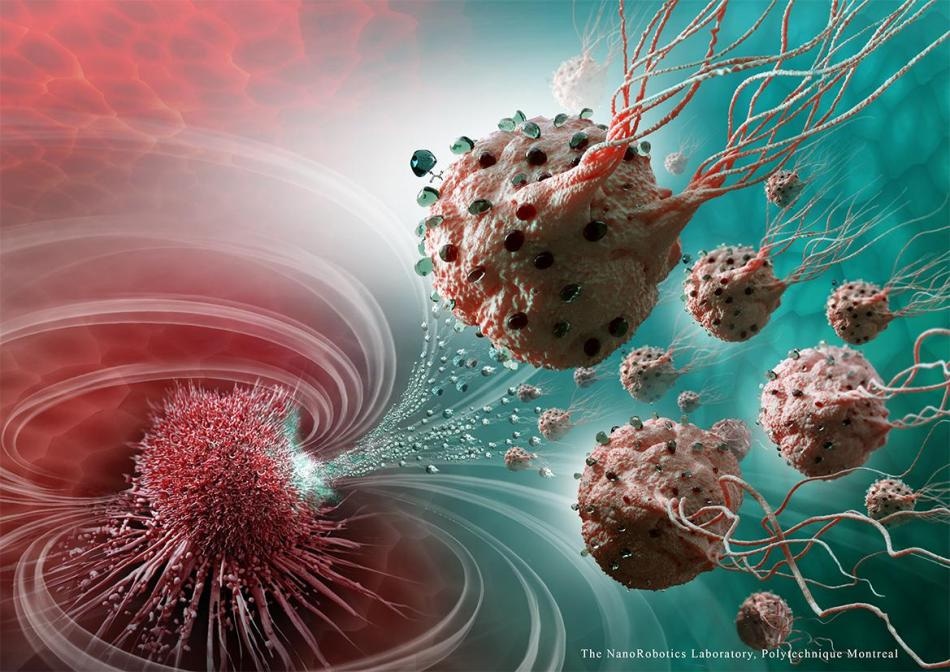Aug 16 2016
 The legions of nanorobotic agents are actually composed of more than 100 million flagellated bacteria -- and therefore self-propelled -- and loaded with drugs that moved by taking the most direct path between the drug's injection point and the area of the body to cure. (Credit: Montréal Nanorobotics Laboratory)
The legions of nanorobotic agents are actually composed of more than 100 million flagellated bacteria -- and therefore self-propelled -- and loaded with drugs that moved by taking the most direct path between the drug's injection point and the area of the body to cure. (Credit: Montréal Nanorobotics Laboratory)
A research team from Polytechnique Montréal, McGill University, and Université de Montréal has successfully developed novel nanorobotic agents that travel through the bloodstream and precisely inject a drug by targeting the active regions of cancerous tumors. The study represents a scientific breakthrough in cancer research.
This precise way of administering medication not only ensures the specific targeting of tumors, but also protects the integrity of organs and the adjacent healthy tissues. The intake of highly toxic drugs by human begins can be considerably reduced.
The study has been reported in the prestigious Nature Nanotechnology journal in an article titled “Magneto-aerotactic bacteria deliver drug-containing nanoliposomes to tumour hypoxic regions.” The article describes the outcome of the study performed on mice, whose colorectal tumors were injected with nanorobotic agents.
These legions of nanorobotic agents were actually composed of more than 100 million flagellated bacteria - and therefore self-propelled - and loaded with drugs that moved by taking the most direct path between the drug’s injection point and the area of the body to cure. The drug’s propelling force was enough to travel efficiently and enter deep inside the tumours.
Professor Sylvain Martel
When the nanorobotic agents penetrate a tumor, they detect the oxygen-depleted tumor areas called hypoxic zones in an entirely autonomous way and effectively deliver the drug to these regions. This hypoxic zone is produced by the considerable uptake of oxygen by tumor cells that multiply rapidly.
Hypoxic zones are resistant to radiotherapy and most of the other therapies. However, it is very difficult to gain access to tumors by navigating paths that are small as a red blood cell and crossing complicated physiological micro-environments. Consequently, Professor Martel and his research team employed nanotechnology to resolve these challenges.
Bacteria with Compass
The bacteria employed by Professor Martel’s team rely on two natural systems to move around. A specific compass produced through the synthesis of magnetic nanoparticles allows the bacteria to move towards the direction of a magnetic field, and at the same time a sensor measuring oxygen concentration allows them to reach and stay in the active regions of the tumor.
Researchers exploited these two transportation systems and subjected these microorganisms to a magnetic field controlled by computer, finally revealing that these bacteria can easily reproduce the future artificial nanorobots designed for this specific task.
This innovative use of nanotransporters will have an impact not only on creating more advanced engineering concepts and original intervention methods, but it also throws the door wide open to the synthesis of new vehicles for therapeutic, imaging and diagnostic agents. Chemotherapy, which is so toxic for the entire human body, could make use of these natural nanorobots to move drugs directly to the targeted area, eliminating the harmful side effects while also boosting its therapeutic effectiveness.
Professor Sylvain Martel
Professor Martel ‘s work was funded by the Consortium québécois sur la découverte du médicament (Québec consortium for drug discovery – CQDM), the Natural Sciences and Engineering Research Council of Canada (NSERC), the Canada Research Chairs, the Research Chair in Nanorobotics of Polytechnique Montréal, Mitacs, the National Institutes of Health (NIH), and the Canada Foundation for Innovation (CFI).
The Institute for Research in Immunology and Cancer (IRIC), the McGill University Health Centre (MUHC), Montréal’s Jewish General Hospital, and the Rosalind and Morris Goodman Cancer Research Centre also participated in this study.